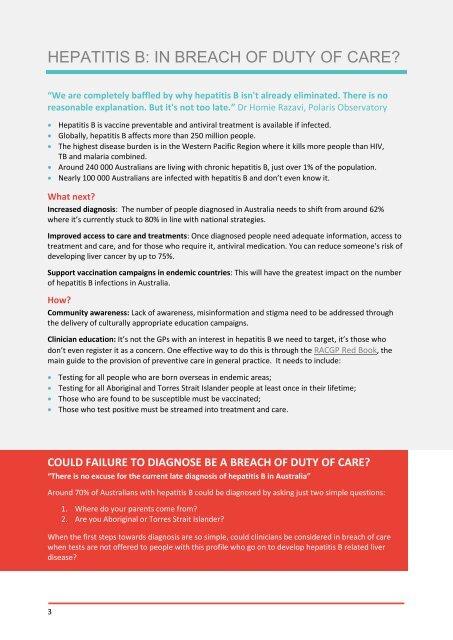AVHEC17 Key Research Summary Conference Report
This report captures key learnings from the inaugural Australasian Viral Hepatitis Elimination Conference (AVHEC 2017). The conference took place on 10-11 August 2017 in Cairns, Queensland, with over 300 delegates including health professionals, policy makers, researchers, community organisations and people living with viral hepatitis committed to eliminating hepatitis B and C as a major public health threat. The conference was organised by the Australasian Society for HIV, Viral Hepatitis and Sexual Health Medicine (ASHM) with a program highlighting latest scientific developments, as well as real world implementation of best practice care. The meeting offered opportunities for structured dialogue assessing where we are and the work still to be done in the Australasian response to viral hepatitis. Download a PDF version of this report here: http://bit.ly/AVHEC17ReportPDF Visit the conference website www.avhec.com.au
This report captures key learnings from the inaugural Australasian Viral Hepatitis Elimination Conference (AVHEC 2017). The conference took place on 10-11 August 2017 in Cairns, Queensland, with over 300 delegates including health professionals, policy makers, researchers, community organisations and people living with viral hepatitis committed to eliminating hepatitis B and C as a major public health threat.
The conference was organised by the Australasian Society for HIV, Viral Hepatitis and Sexual Health Medicine (ASHM) with a program highlighting latest scientific developments, as well as real world implementation of best practice care. The meeting offered opportunities for structured dialogue assessing where we are and the work still to be done in the Australasian response to viral hepatitis. Download a PDF version of this report here: http://bit.ly/AVHEC17ReportPDF
Visit the conference website www.avhec.com.au
You also want an ePaper? Increase the reach of your titles
YUMPU automatically turns print PDFs into web optimized ePapers that Google loves.
HEPATITIS B: IN BREACH OF DUTY OF CARE?<br />
“We are completely baffled by why hepatitis B isn't already eliminated. There is no<br />
reasonable explanation. But it's not too late.” Dr Homie Razavi, Polaris Observatory<br />
Hepatitis B is vaccine preventable and antiviral treatment is available if infected.<br />
Globally, hepatitis B affects more than 250 million people.<br />
The highest disease burden is in the Western Pacific Region where it kills more people than HIV,<br />
TB and malaria combined.<br />
Around 240 000 Australians are living with chronic hepatitis B, just over 1% of the population.<br />
Nearly 100 000 Australians are infected with hepatitis B and don’t even know it.<br />
What next?<br />
Increased diagnosis: The number of people diagnosed in Australia needs to shift from around 62%<br />
where it’s currently stuck to 80% in line with national strategies.<br />
Improved access to care and treatments: Once diagnosed people need adequate information, access to<br />
treatment and care, and for those who require it, antiviral medication. You can reduce someone's risk of<br />
developing liver cancer by up to 75%.<br />
Support vaccination campaigns in endemic countries: This will have the greatest impact on the number<br />
of hepatitis B infections in Australia.<br />
How?<br />
Community awareness: Lack of awareness, misinformation and stigma need to be addressed through<br />
the delivery of culturally appropriate education campaigns.<br />
Clinician education: It’s not the GPs with an interest in hepatitis B we need to target, it’s those who<br />
don’t even register it as a concern. One effective way to do this is through the RACGP Red Book, the<br />
main guide to the provision of preventive care in general practice. It needs to include:<br />
Testing for all people who are born overseas in endemic areas;<br />
Testing for all Aboriginal and Torres Strait Islander people at least once in their lifetime;<br />
Those who are found to be susceptible must be vaccinated;<br />
Those who test positive must be streamed into treatment and care.<br />
COULD FAILURE TO DIAGNOSE BE A BREACH OF DUTY OF CARE?<br />
“There is no excuse for the current late diagnosis of hepatitis B in Australia”<br />
Around 70% of Australians with hepatitis B could be diagnosed by asking just two simple questions:<br />
1. Where do your parents come from?<br />
2. Are you Aboriginal or Torres Strait Islander?<br />
When the first steps towards diagnosis are so simple, could clinicians be considered in breach of care<br />
when tests are not offered to people with this profile who go on to develop hepatitis B related liver<br />
disease?<br />
3



